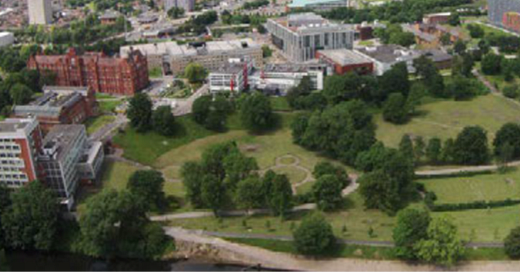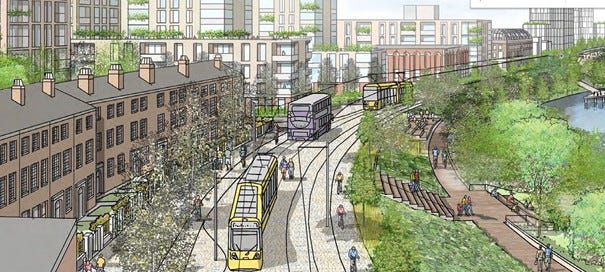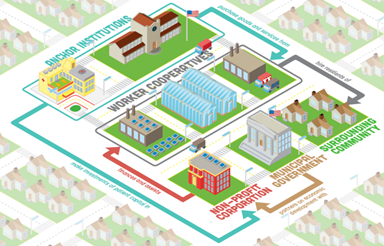Economics with People
Volume 1: Chapter 3: Conditions in Salford and preparatory work for Economies for Healthier Lives
What does co-production in economic development mean in reality?
Salford is a city in the centre of the city-region of Greater Manchester, to the east of which is the city of Manchester. Historically, Salford was a major centre for cotton and silk spinning and weaving during the industrial revolution in the 18th and 19th centuries, when it was the birthplace of many social and economic innovations. Its status was burnished by the opening in 1894 of the Manchester Ship Canal and Salford Docks, which became one of the largest ports in the world.
There was, however, industrial decline in Salford from the 1930s onwards, exacerbated during the late 1970s and 1980s. This created major economic, social and environmental problems, and caused significant inequalities in wealth and health.
Driven by the development of Salford Quays from 2000, including Media City from 2007, Salford now has the fastest growing economy and the fastest growing population in north-west England, with increasing demographic diversity. These are reflected in other developments such as Crescent Salford and the RHS Garden Bridgewater, which are being followed by the Salford Innovation Triangle and Port Salford.
The benefits of these developments have, however, not spread evenly across the whole population of Salford. The trends have, in fact, created the ‘Salford dichotomy’ or ‘a tale of two cities’, in which a significant part of the population is doing economically well, but another significant part has felt little if any benefit to its wealth or economic activity.
Unlimited Potential found symptoms of this challenging situation during its FACT (Fuelling Ambitions Creatively Together) project. Many young people from low-wealth backgrounds in local schools had few, if any, links with any local growth industries, and often even little awareness or experience of them. The educational and work system essentially offered them two choices: going into further education or getting (often low-paid, low-status) employment. There was little evidence of learning or support for any form of entrepreneurship.
The dominant economic system had created great opportunity for some people, but risk and precarity for many others. In response, Salford mapped out the city’s economic future in the Salford Way. Launched in March 2021, this included a progressive inclusive and green economy strategy. This was based on community wealth-building and explicitly recognised the importance of the social economy, including Salford’s status as a designated social enterprise city.
This was complemented by the Salford Locality Plan 2020-2025 for health and well-being, which recognised economic equality as a key determinant.
Over some 20 years, Salford had created a largely collaborative culture between agencies, especially those in the public and voluntary, community and social enterprise (VCSE) sectors. This culture supported the local system’s positive response to the concept of community wealth-building. This is a people-led approach in which communities build and retain their own wealth and health together.
The local institutional culture also facilitated support to apply to the Health Foundation for its Economies for Healthier Lives programme,. This aims to promote health and to reduce health inequalities through economic development strategies by strengthening relationships between economic development and health.
Rather than taking a traditional institutionally led approach, Salford City Council invited Unlimited Potential to lead the proposal, with the local authority acting as a convenor and facilitator. The was based on Unlimited Potential’s long track record of social and economic innovation within and beyond the city, including its experience of co-production with diverse local people.
Unlimited Potential worked with partners and local people to draw on prevailing circumstances, culture and policy in Salford, as well as the research base, to create the proposed approach.
This proposes a transition between the current dominant system to a new horizon: a fairer and more inclusive local economy that delivers greater social and environmental justice, where wealth is shared more widely across all communities.
For Salford, this means moving together towards a more inclusive economy, where wealth is shared more fairly, and the city becomes fairer, greener and healthier. This will be supported by economic development and public health professionals deepening their working partnerships.
As well as this proposed systemic change, this approach has two practical aspects:
· Action by private, public and social organisations that are tied to and have an important presence in Salford - local anchor institutions. Individually and collectively, they will move more of their money away from suppliers that extract it from the local economy to those that benefit local communities.
· At the same time, local people will together create and own social / co-operative businesses to supply goods, works and services to the local anchor organisations.
What does this mean for you?
· What is the geographical, cultural and policy context in which your organisation is working?
· How much recognition does your locality or organisation give to the importance of the social economy?
Please share your comments, answers and questions with us using the ‘leave a comment’ button below. If you have a newsletter and would like to feature us, please get in touch.
Next time: what did we do in practice with local people and organisations to start working towards economies for healthier lives?
Next chapter here:
Economics with People
In this chapter we will cover why we think it is worth making the effort to reach and involve communities which are rarely listened to and how to do this. If you are interested in working with a diverse group of local people and creating an environment conducive to building relationships, sharing power and developing new ideas then stay tuned.








